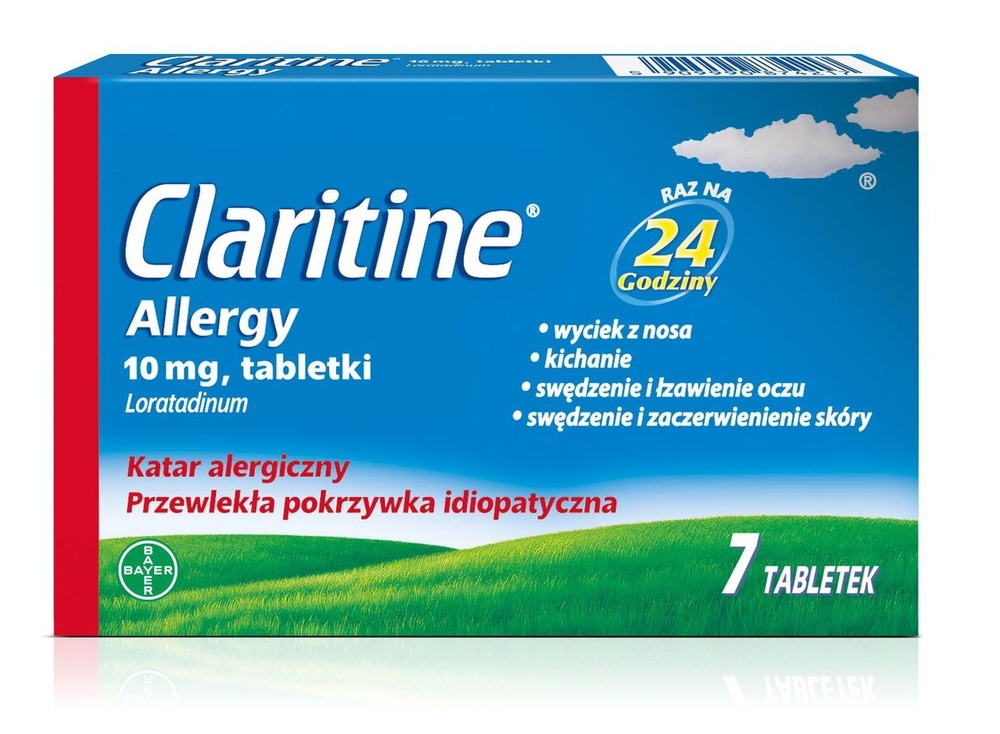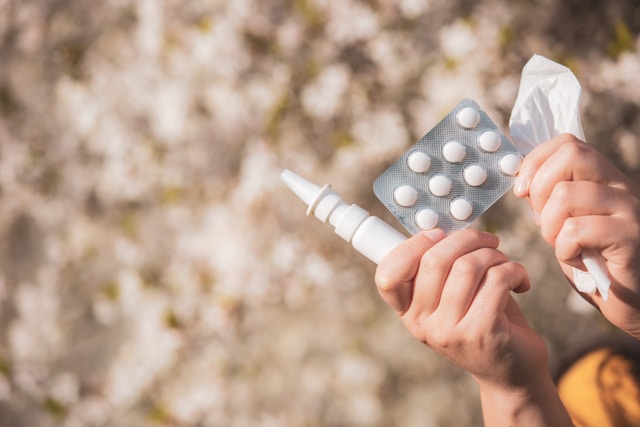

Claritine

Ask a doctor about a prescription for Claritine

How to use Claritine
Package Leaflet: Information for the Patient
CLARITINE, 10 mg, tablets
Loratadine
Read the package leaflet carefully before taking the medicine, as it contains important information for the patient.
- Keep this leaflet, you may need to read it again.
- If you have any further questions, ask your doctor or pharmacist.
- This medicine has been prescribed for you only. Do not pass it on to others. It may harm them, even if their symptoms are the same as yours.
- If you experience any side effects, including any not listed in this leaflet, please tell your doctor or pharmacist. See section 4.
Table of Contents of the Leaflet
- 1. What is Claritine and what is it used for
- 2. Important information before taking Claritine
- 3. How to take Claritine
- 4. Possible side effects
- 5. How to store Claritine
- 6. Contents of the pack and other information
1. What is Claritine and what is it used for
The active substance of Claritine, loratadine, is a tricyclic antihistamine, a selective antagonist of peripheral histamine H1receptors.
Claritine is an antiallergic medicine that does not cause drowsiness. Claritine is indicated for the treatment of symptoms of allergic rhinitis (such as sneezing, runny nose, and itching, burning, and redness of the eyes) and chronic idiopathic urticaria.
2. Important information before taking Claritine
When not to take Claritine:
- if you are allergic to loratadine or any of the other ingredients of this medicine (listed in section 6).
Warnings and precautions
Before taking Claritine, discuss it with your doctor or pharmacist:
- if you have severe liver impairment (see section 3. How to take Claritine).
Skin tests:
You should stop taking Claritine about 48 hours before the planned skin test, as antihistamines may cause false-negative results of these tests (they may reduce or completely inhibit the skin reaction that would normally be positive).
Claritine and other medicines
Side effects may be increased when taking Claritine with medicines that affect the activity of certain enzymes responsible for drug metabolism in the liver.
However, in clinical studies, no increase in side effects was observed when loratadine was taken with medicines that affect the activity of these enzymes.
Taking loratadine with ketoconazole, erythromycin, or cimetidine increases the concentration of loratadine in the blood, but without clinical consequences. Taking loratadine with medicines that affect liver metabolism should be done under medical supervision.
Tell your doctor or pharmacist about all medicines you are taking now or have recently taken, as well as any medicines you plan to take. This also applies to medicines available without a prescription.
Taking Claritine with food, drink, and alcohol
The medicine can be taken independently of meals.
The medicine taken with alcohol does not increase its effects to a degree that can be assessed by psychomotor tests.
Pregnancy, breastfeeding, and fertility
If you are pregnant or breastfeeding, think you may be pregnant, or are planning to have a baby, ask your doctor or pharmacist for advice before taking this medicine.
As a precaution, it is recommended to avoid taking Claritine during pregnancy.
Loratadine passes into breast milk, so it is not recommended to take the medicine during breastfeeding.
There are no data on fertility in men and women.
Driving and using machines
In clinical studies, loratadine did not affect or had a negligible effect on the ability to drive and use machines. In some people, very rarely, drowsiness occurred, which could impair the ability to drive and use machines.
Claritine contains lactose
The medicine contains lactose as an excipient. If you have been diagnosed with intolerance to some sugars, you should consult your doctor before taking the medicine.
3. How to take Claritine
Take this medicine always as directed by your doctor. If you are not sure, ask your doctor.
The break line on the tablet is only to facilitate breaking the tablet to make it easier to swallow.
Recommended dose
Adults and children over 12 years:
10 mg (one tablet) once a day. The medicine can be taken independently of meals.
Children from 2 to 12 years:
Body weight over 30 kg: 10 mg (one tablet) once a day.
It is not recommended to take tablets (10 mg) in children whose body weight is less than 30 kg.
In these children, Claritine can be taken in the form of syrup.
The safety and efficacy of the medicine in children under 2 years of age have not been established.
Patients with liver function disorders:
In patients with severe liver impairment, a lower initial dose should be used, as the clearance of loratadine may be reduced in these patients. In such cases, adults and children over 30 kg should be given 10 mg of loratadine (in the form of tablets or syrup) every other day, and children under 30 kg - 5 mg of loratadine (in the form of syrup) every other day.
No dose adjustment is needed in elderly patients and patients with renal impairment.
If you feel that the effect of Claritine is too strong or too weak, talk to your doctor.
Taking a higher dose of Claritine than recommended
If you have taken more than the recommended dose of Claritine, contact your doctor or pharmacist immediately.
After an overdose of loratadine, the following have been observed: drowsiness, increased heart rate, and headache.
In the event of an overdose, symptomatic and supportive treatment should be applied immediately and continued as long as necessary. Activated charcoal can be given as a water suspension. Gastric lavage can also be performed. Loratadine cannot be removed from the body by hemodialysis, and it is not known whether it can be removed by peritoneal dialysis. After providing assistance, the patient should continue to be monitored.
There are no data indicating that loratadine causes abuse or dependence.
Missing a dose of Claritine
Do not take a double dose to make up for a missed dose.
If you have any further questions about taking this medicine, ask your doctor or pharmacist.
4. Possible side effects
Like all medicines, Claritine can cause side effects, although not everybody gets them.
Common side effectsassociated with taking Claritine (in 1 to 10 out of 100 patients taking the medicine) are:
- in children from 2 to 12 years - headache, nervousness, and fatigue,
- in adults and adolescents - drowsiness.
Uncommon side effectsassociated with taking Claritine (in 1 to 10 out of 1000 patients taking the medicine) in adults and adolescents are:
- headache, increased appetite, and insomnia, fatigue, dry mouth, gastrointestinal disorders such as nausea, gastritis, and allergic reactions such as rash.
Rare side effects(less than 1 in 10,000 patients taking the medicine), observed after the medicine was placed on the market, are:
- severe allergic reaction (including difficulty breathing, wheezing, itching, urticaria, swelling). If severe allergic reactions occur, stop taking the medicine and contact your doctor immediately.
- dizziness, convulsions, increased heart rate, palpitations, abnormal liver function, hair loss.
Side effects of unknown frequency(frequency cannot be estimated from available data): weight gain.
Some people may experience other side effects while taking Claritine.
Reporting side effects
If you experience any side effects, including any not listed in this leaflet, please tell your doctor or pharmacist, or nurse. Side effects can be reported directly to the Department of Drug Safety Monitoring of the Office for Registration of Medicinal Products, Medical Devices, and Biocidal Products:
Al. Jerozolimskie 181C, 02-222 Warsaw, tel.: 22 49-21-301, fax: 22 49-21-309, e-mail:
[email protected] .
Side effects can also be reported to the marketing authorization holder.
Reporting side effects will help to gather more information on the safety of this medicine.
5. How to store Claritine
Keep the medicine out of the sight and reach of children.
Store in a temperature below 25°C.
Do not use this medicine after the expiry date stated on the packaging after: EXP.
The expiry date refers to the last day of the month stated.
Medicines should not be disposed of via wastewater or household waste. Ask your pharmacist how to dispose of medicines no longer required. This will help protect the environment.
6. Contents of the pack and other information
What Claritine contains
- The active substance is loratadine. One tablet contains 10 mg of loratadine.
- The other ingredients (excipients) are: lactose monohydrate, corn starch, magnesium stearate.
What Claritine looks like and contents of the pack
Claritine is a white or almost white, uncoated tablet of oval shape, with a break line on one side, and the other side is smooth.
30 or 60 tablets are available in blisters of Al/PVC or Al/PVC/PVDC, in a cardboard box.
Marketing authorization holder and manufacturer
Marketing authorization holder:
Bayer Sp. z o.o.
Al. Jerozolimskie 158
02-326 Warsaw
Tel.: + 48 22 572-35-00
Manufacturer:
Bayer Bitterfeld GmbH
Ortsteil Greppin
Salegaster Chaussee 1
06803 Bitterfeld-Wolfen
Germany
Date of last revision of the leaflet:
- Country of registration
- Active substance
- Prescription requiredYes
- Manufacturer
- ImporterBayer Bitterfeld GmbH
- This information is for reference only and does not constitute medical advice. Always consult a licensed doctor before taking any medication. Oladoctor is not responsible for medical decisions based on this content.
- Alternatives to ClaritineDosage form: Tablets, 10 mgActive substance: loratadineManufacturer: US Pharmacia Sp. z o.o.Prescription requiredDosage form: Tablets, 5 mg + 120 mgActive substance: loratadineManufacturer: SAG MANUFACTURING, S.L.U.Prescription not requiredDosage form: Tablets, 10 mgActive substance: loratadineManufacturer: Bayer Bitterfeld GmbHPrescription not required
Alternatives to Claritine in other countries
The best alternatives with the same active ingredient and therapeutic effect.
Alternative to Claritine in Spain
Alternative to Claritine in Ukraine
Online doctors for Claritine
Discuss dosage, side effects, interactions, contraindications, and prescription renewal for Claritine – subject to medical assessment and local rules.















